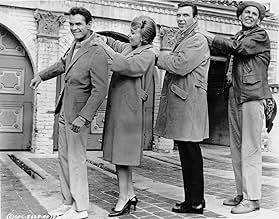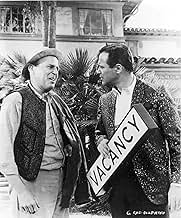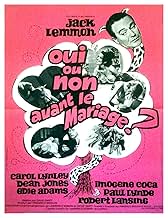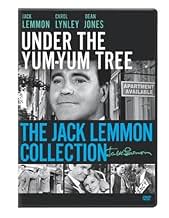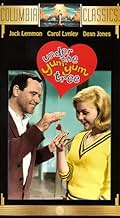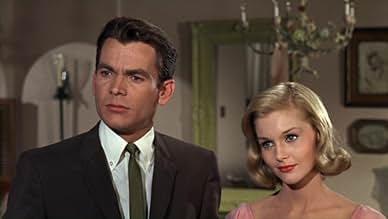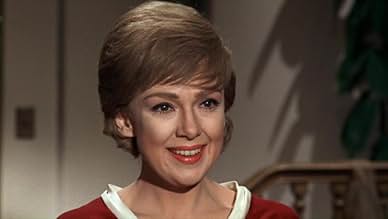CALIFICACIÓN DE IMDb
6.0/10
2.2 k
TU CALIFICACIÓN
Un casero enamorado trata de convencer a una bonita inquilina de que deje a su prometido y le dé una oportunidad.Un casero enamorado trata de convencer a una bonita inquilina de que deje a su prometido y le dé una oportunidad.Un casero enamorado trata de convencer a una bonita inquilina de que deje a su prometido y le dé una oportunidad.
- Premios
- 2 nominaciones en total
Jerry Antes
- Adam
- (sin créditos)
Tom Anthony
- Barber
- (sin créditos)
Army Archerd
- Writer
- (sin créditos)
Phil Arnold
- Delivery Man
- (sin créditos)
Roger Bacon
- Writer
- (sin créditos)
Bill Bixby
- Track Team Coach
- (sin créditos)
Paul Bradley
- Barbershop Customer
- (sin créditos)
Françoise Bush
- College Girl
- (sin créditos)
Gloria Calomee
- Sandy
- (sin créditos)
Cliff Carnell
- Athletic Instructor
- (sin créditos)
Opiniones destacadas
There are so many competent recaps, I will spare readers of my own. However, suffice it to say that this is a pretty simple movie.
The poor reviews were really fascinating to see before I watched the movie, so naturally, I felt even more intrigued. I will admit that this is not Oscar-worthy material in any way. It's a fluffy movie that had earnest attempts at humor and levity. It isn't going to make anyone see life differently, *unless*: you are able to open your mind a little.
The underlying message of the movie is initially "it's wrong to live together romantically unless you're married" (typical mid-century mindset). The secondary theme is "misunderstanding". The love interest is misled both intentionally and unintentionally, which results in the eventual winning of her heart.
But, the final message that I took from this movie is the one that was eloquently stated by Aunt Irene, who states that "love is created", and doesn't fall off a tree. Even when it seems that way, your relationship is not going to be butterflies and flowers forever, no matter how in-love you begin. It's about truly caring for the other, and trying to offer them grace and understanding.
This was at the very end of the movie, and it inspired me to actually like the movie enough to save it on my DVR!
The biggest downfalls of this movie, aside from the many you've read already, are the fact that it's boring when there is a lack of dialogue and only Jack Lemmon making goofy faces; the portions with the meddling groundskeeper and his wife were also like watching a sitcom, nothing special or unique. The most interesting non-plot feature to me was the incredible set, full of both real and fake objects. It was just so colorful, starting with the opening theme song.
The most impressive moment of all: when the celebrity kitty (Orangey) was holding himself up with front paws on a brick wall, while drinking a saucer of milk. Incredibly adorable and worth seeing!
The poor reviews were really fascinating to see before I watched the movie, so naturally, I felt even more intrigued. I will admit that this is not Oscar-worthy material in any way. It's a fluffy movie that had earnest attempts at humor and levity. It isn't going to make anyone see life differently, *unless*: you are able to open your mind a little.
The underlying message of the movie is initially "it's wrong to live together romantically unless you're married" (typical mid-century mindset). The secondary theme is "misunderstanding". The love interest is misled both intentionally and unintentionally, which results in the eventual winning of her heart.
But, the final message that I took from this movie is the one that was eloquently stated by Aunt Irene, who states that "love is created", and doesn't fall off a tree. Even when it seems that way, your relationship is not going to be butterflies and flowers forever, no matter how in-love you begin. It's about truly caring for the other, and trying to offer them grace and understanding.
This was at the very end of the movie, and it inspired me to actually like the movie enough to save it on my DVR!
The biggest downfalls of this movie, aside from the many you've read already, are the fact that it's boring when there is a lack of dialogue and only Jack Lemmon making goofy faces; the portions with the meddling groundskeeper and his wife were also like watching a sitcom, nothing special or unique. The most interesting non-plot feature to me was the incredible set, full of both real and fake objects. It was just so colorful, starting with the opening theme song.
The most impressive moment of all: when the celebrity kitty (Orangey) was holding himself up with front paws on a brick wall, while drinking a saucer of milk. Incredibly adorable and worth seeing!
Sure, the premise is sleazy, Jack Lemmon is embarrassing but the film is fast paced and certainly bouncy. The main reason to watch is because of a very charming and funny performance by the lovely Carol Lynley. Although she hasn't had many chances during her career to show off her comedic talents, this film contains a wonderfully funny scene in which Ms. Lynley's character is drunk. Her boyfriend, played perfectly by Dean Jones, is trying not to take advantage of her 'accessibility'. She runs the gamut from sexy to goofy with excellent timing. It is a wonderful performance and one that helps to take an edge off of the sleaziness of the main plot (Mr. Lemmon's apartment manager trying to deflower all these attractive young women).
I've been catching up on a few of these early sixties semi-sex comedies, while in Covid essential isolation. I'm starting to fall in love with Carol Lynley though sadly, she died about a year ago. Jack Lemmon is always funny and interesting, Edie Adams is forever appealing and Paul Lynde, as the frustrated repressed wannabe letch is amusing to watch.
Yes, I was entertained throughout, yes it was relatively original and yes, I recommend it. However, it does go on for a bit too long without veering direction and there's never a moment when you don't know where it's going to end up. It was, after all, 1963, when the Hays code was starting to be lifted but wasn't quite there yet. Young people in the country were preparing for the sexual revolution but they weren't quite there yet, either. By 1967, the year of Bonnie and Clyde, The Graduate and the year after Who's Afraid of Virginia Woolf, the dynamic between this couple would have been entirely different. And by 1974, the film could have gone in a wide assortment of directions. In 1963, again at the time of the almost sex comedy, there was really only one way this film could go. Watching it get there was entertaining but again, it needed a few more turns and twists to justify the length.
Norman Fell's landlord character from The Graduate ended up as the landlord on Three's Company. It might have been interesting to see this landlord replace him.
Yes, I was entertained throughout, yes it was relatively original and yes, I recommend it. However, it does go on for a bit too long without veering direction and there's never a moment when you don't know where it's going to end up. It was, after all, 1963, when the Hays code was starting to be lifted but wasn't quite there yet. Young people in the country were preparing for the sexual revolution but they weren't quite there yet, either. By 1967, the year of Bonnie and Clyde, The Graduate and the year after Who's Afraid of Virginia Woolf, the dynamic between this couple would have been entirely different. And by 1974, the film could have gone in a wide assortment of directions. In 1963, again at the time of the almost sex comedy, there was really only one way this film could go. Watching it get there was entertaining but again, it needed a few more turns and twists to justify the length.
Norman Fell's landlord character from The Graduate ended up as the landlord on Three's Company. It might have been interesting to see this landlord replace him.
It's been so many years since I've seen this, but I remember watching it as a teenager and thinking -- these are grownups here. *I'm* old enough to know what's going on. And this isn't funny. It reminds me of Matt Groening's Paradox:
* The French are funny.
* Sex is funny.
* Comedies are funny.
Yet, NO FRENCH SEX COMEDY IS FUNNY. Replace "French" with "Jack Lemmon", and, had you stumbled onto this film as your first and only exposure to that otherwise great actor, you might be tempted to banish Lemmon from your living room forever.
* The French are funny.
* Sex is funny.
* Comedies are funny.
Yet, NO FRENCH SEX COMEDY IS FUNNY. Replace "French" with "Jack Lemmon", and, had you stumbled onto this film as your first and only exposure to that otherwise great actor, you might be tempted to banish Lemmon from your living room forever.
Ben Mankiewicz noted on TCM that Jack Lemmon was not happy being assigned this film version of a semi-hit Broadway sex comedy from 1960, and you can see why. As the libidinous landlord of a California complex who rents out only to nubile young things, he's playing an absolutely awful man, and for all his comic finesse, he's charmless and irritating. In Lawrence Roman's oversexed plot (he adapted his play with director David Swift), Lemmon's Hogan mistakenly rents a beautiful one bedroom (for $75 a month; oh, to be in 1963) to undergrad Carol Lynley, who plans to share it platonically with her fiancé, Dean Jones, who had played this part on Broadway. And from there it's one long smirk, with Lynley wiggling her fanny in short-short outfits, Jones bemoaning how difficult a no-sex policy is, and Lemmon mugging and being thoroughly unpleasant. Edie Adams, as Lemmon's ex and Lynley's aunt, is a pro, and Paul Lynde, as a horny-for-young-girls (ha) gardener, and Imogene Coca, as his disapproving wife, wring what laughs they can out of repellent material. If you want to know what '60s sex comedies were like, with endless jokes on will-she-won't- she-lose-her-virginity, this is a good example, typically over lit and supplemented with a cutesy Frank DeVol score. And Lynley and Jones are charming. But given the change in morality in intervening years, it looks it was made on another planet.
¿Sabías que…?
- TriviaTo help out his friend Edie Adams financially after her husband Ernie Kovacs's sudden death left her debt-ridden, star/co-producer Jack Lemmon not only insisted upon hiring her for this film, but further insisted that her part be expanded considerably from the original stage play to give her more work.
- ErroresRobin comes up to the door of her apartment with a bag of groceries, which includes two upside-down bunches of celery (root end up), and a square-shaped box of eggs. Then as the camera angle switches to show her coming through the door, the two bunches of celery have suddenly switched to right side up (leafy end up), and the square box of eggs has magically turned into a rectangular shaped box.
- ConexionesFeatured in Hollywood and the Stars: The Funny Men: Part 2 (1963)
Selecciones populares
Inicia sesión para calificar y agrega a la lista de videos para obtener recomendaciones personalizadas
- How long is Under the Yum Yum Tree?Con tecnología de Alexa
- Is "Under the Yum Yum Tree" based on a book?
- Why was there a controversy about this movie when it was originally released?
- What was the Mexican liquor that Robin and David were drinking?
Detalles
- Fecha de lanzamiento
- País de origen
- Idiomas
- También se conoce como
- Under the Yum Yum Tree
- Locaciones de filmación
- 1355 N. Laurel Ave., West Hollywood, California, Estados Unidos(Centaur Apartments)
- Productora
- Ver más créditos de la compañía en IMDbPro
- Tiempo de ejecución1 hora 50 minutos
- Relación de aspecto
- 1.85 : 1
Contribuir a esta página
Sugiere una edición o agrega el contenido que falta

Principales brechas de datos
By what name was El pícaro seductor (1963) officially released in India in English?
Responda

